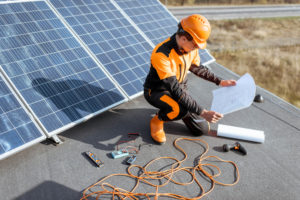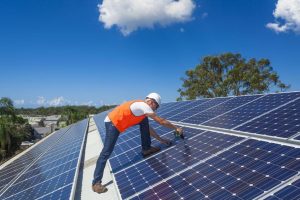The solar industry is growing rapidly, increasing demand for skilled professionals to design and install solar PV systems. If you’re interested in pursuing a career in renewable energy or are already working in the solar energy field, it’s important to have a comprehensive understanding of solar panel installation. This guide will explore solar panel installation training programs, job opportunities, and the importance of hands-on learning in this evolving industry.
Contents
- 1 Key Takeaways
- 2 The Significance of Hands-On Learning
- 3 Design and Installation Excellence
- 4 Ensuring System Longevity: Operations and Maintenance
- 5 Navigating Job Training and Employment Opportunities
- 6 A Glimpse into the Life of a Solar Installer
- 7 Expert Insights From Our Solar Panel Installers About Solar Panel Installation Training
- 8 Experience Solar Excellence with Us!
- 9 Conclusion
Key Takeaways
- Hands-on training is essential for future solar installers, providing practical experience and problem-solving skills.
- Solar installation training covers system design, best practices, and maintenance, ensuring safe and efficient installations.
- The solar industry offers promising career opportunities, with NABCEP certification enhancing job prospects in this growing field.
The Significance of Hands-On Learning
Advantages of Practical Solar Installation Training
To excel in the solar industry, hands-on experience is paramount. While theoretical knowledge is essential, the ability to apply that knowledge in a practical setting is what sets successful solar installers apart. Hands-on training provides an invaluable opportunity to work with actual solar PV systems, allowing trainees to familiarize themselves with the equipment and tools they will encounter in the field.
Hands-on learning not only builds confidence but also helps trainees develop problem-solving skills. They can troubleshoot and address real-world issues, gaining the practical experience needed to tackle challenges on the job.
Building Essential Electrical Skills
Solar installation involves intricate electrical work and not just mounting panels on rooftops. A strong foundation in electrical skills is crucial for ensuring the safety and efficiency of solar PV systems.
Training programs often cover electrical circuitry, wiring, and the safe handling of electrical components. Understanding these principles is essential for designing, installing, and maintaining solar PV systems that meet industry standards.

Design and Installation Excellence
Solar PV System Design Essentials
A fundamental aspect of solar installation training is understanding how to design PV systems. Designing an efficient and effective solar PV system requires careful consideration of location, shading, and energy requirements.
During training, students learn to analyze these factors and use software tools to design systems that maximize energy production. This knowledge is vital for creating customized solutions that meet the unique needs of each installation.
The Crucial Role of Installation in Solar Projects
Solar panel installation is the hands-on aspect of bringing a solar PV system to life. It involves mounting solar panels, connecting electrical components, and ensuring the system’s proper functioning.
Installation training covers various installation techniques, including roof-mounted and ground-mounted systems. Trainees learn how to handle solar panels safely, connect them to inverters, and troubleshoot any issues that may arise during installation.
Best Practices for Solar Panel Installation
The solar industry adheres to rigorous standards to ensure the safety and efficiency of solar installations. Solar panel installation training programs emphasize compliance with these standards and best practices.
Structural integrity, load calculations, and adherence to local building codes are integral to solar panel installation training. By following best practices, installers can guarantee the durability and longevity of solar PV systems.
Ensuring System Longevity: Operations and Maintenance
Solar PV System Maintenance and Troubleshooting
Once solar PV systems are installed and operational, they require ongoing maintenance to ensure optimal performance. Solar installation training programs teach students to conduct routine maintenance checks, identify potential issues, and perform necessary repairs.
Maintenance training covers cleaning solar panels, inspecting electrical connections, and monitoring system performance. By proactively addressing maintenance needs, solar installers help extend the lifespan of solar PV systems.
Prolonging the Lifespan of Solar Installations
Solar PV systems are long-term investments in renewable energy. To ensure their longevity, it’s essential to provide proper care and maintenance. This includes regular cleaning to remove dust and debris that can reduce efficiency and monitoring for wear and tear on components.
Solar installers can help their clients enjoy reliable energy production for years by understanding the intricacies of solar PV system maintenance.

Exploring Solar Installation Training Programs
To embark on a career in solar panel installation, enrolling in a reputable training program is essential. Many institutions and organizations offer training courses tailored to the needs of aspiring solar installers.
Training programs often cover many topics, including safety protocols, electrical skills, and hands-on installation techniques. Additionally, some programs offer certifications recognized by organizations like NABCEP (North American Board of Certified Energy Practitioners), further enhancing job prospects.
Becoming a Certified Solar Installer
Certifications play a pivotal role in the solar industry. NABCEP certification, for example, is highly regarded and demonstrates a high level of competence in the field. Solar installation training programs often prepare students for certification exams, increasing their credibility in the job market.
Exciting Career Prospects in Solar Installation
The solar industry offers a wealth of employment opportunities. Skilled solar installers are in high demand as residential, commercial, and utility-scale solar projects proliferate. Whether you’re interested in working on residential rooftops, large solar farms, or commercial installations, a career in solar installation holds significant promise.
A Glimpse into the Life of a Solar Installer
First-Person Insights into the Solar Installation Field
As we are deeply involved in the solar industry, we can attest to the rewarding nature of this career. Working as a solar installer allows you to contribute directly to the growth of renewable energy and combat climate change. It’s a field where innovation, sustainability, and job satisfaction intersect.
Embracing the Challenges and Rewards
While the solar installation field offers many rewards, it has challenges. Weather conditions, physical demands, and tight schedules can be demanding. However, the sense of accomplishment that comes with each successfully installed solar system and the knowledge that you’re positively impacting the environment make it all worthwhile.
Expert Insights From Our Solar Panel Installers About Solar Panel Installation Training
Hands-on training is crucial in the solar industry. It bridges the gap between theoretical knowledge and real-world application, ensuring that installers are well-equipped to handle the challenges they will face on the job.
Senior Solar Installer
Understanding the intricacies of electrical work is essential for any solar installer. Proper training in electrical circuitry and safety protocols is key to maintaining the efficiency and safety of solar PV systems.
Lead Solar Technician
Certification, such as NABCEP, not only enhances job prospects but also assures clients of the installer’s expertise and commitment to industry standards.
Solar Installation Trainer
Experience Solar Excellence with Us!
Trust in Solar Panels Network USA, where our seasoned experts deliver top-quality solar solutions for homes and businesses nationwide. With a legacy of countless successful installations and a commitment to sustainable energy, we’re your reliable partner in the solar journey. Ready for a brighter, eco-friendly future? Call us now at (855) 427-0058 and harness the power of the sun!
Conclusion
Solar installation training is the gateway to a promising career in the solar energy industry. With hands-on experience, a strong foundation in electrical skills, and a commitment to excellence, solar installers are driving the transition to renewable energy and shaping a sustainable future for future generations.
About the Author
Solar Panels Network USA stands at the forefront of solar energy solutions, driven by a team of seasoned solar engineers and energy consultants. With over decades of experience in delivering high-quality solar installations and maintenance, we are committed to promoting sustainable energy through customer-centric, tailored solutions. Our articles reflect this commitment, crafted collaboratively by experts to provide accurate, up-to-date insights into solar technology, ensuring our readers are well-informed and empowered in their solar energy decisions.

